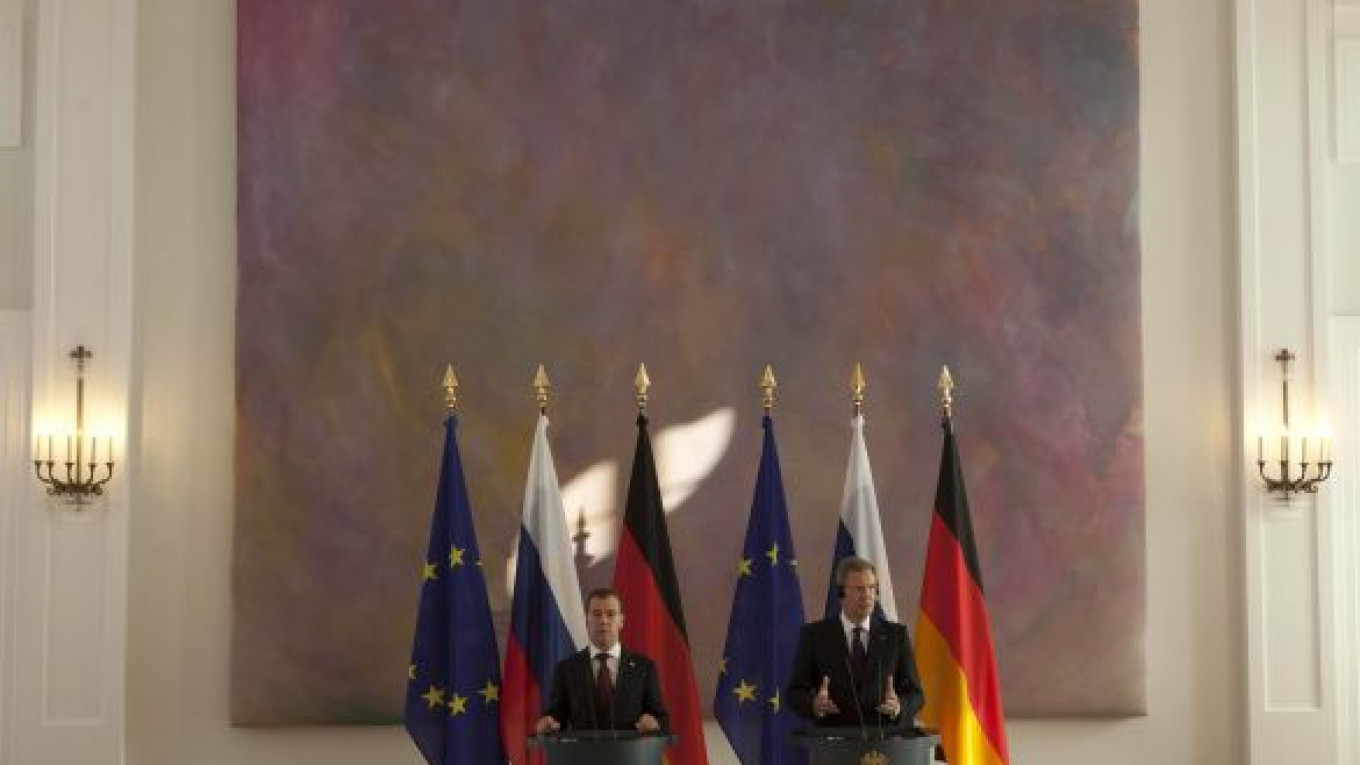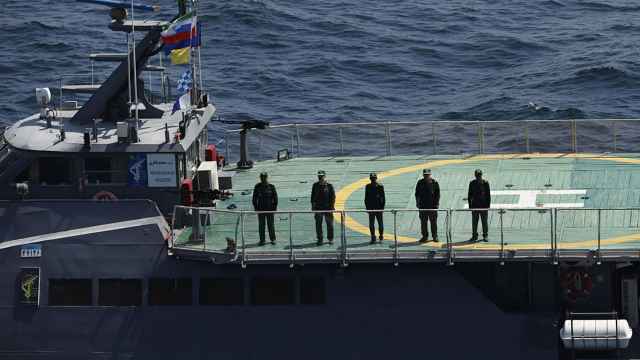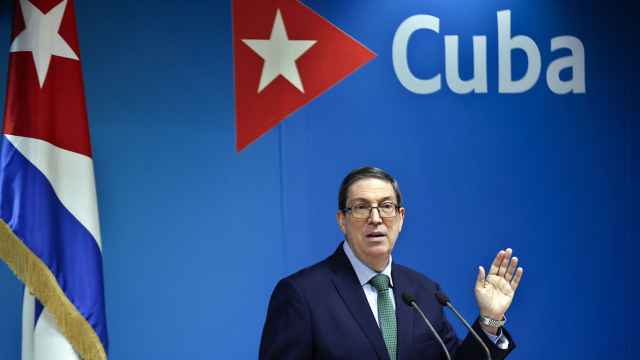President Dmitry Medvedev said Russia expects Europe to overcome its debt crisis and increase demand for gas imports, warning against "artificial barriers" being raised to closer energy ties.
Russia aims to increase energy cooperation with Europe, Medvedev said Tuesday in the northern German town of Lubmin, where he joined Chancellor Angela Merkel and other European leaders to mark the opening of Nord Stream, the first direct gas pipeline connecting Russia and Europe.
With a second pipe under construction, "we are counting on the European economy to overcome all current difficulties and achieve steady growth," Medvedev said. "We will continue to accelerate energy cooperation with our European partners." At the same time, "we count that this cooperation will not have any artificial barriers. There is no economically justifiable alternative" to such cooperation.
The 7.4 billion euro ($10.2 billion) pipeline under the Baltic Sea was designed at a time when European Union demand for natural gas and imports from Gazprom were rising.
Because gas demand in the EU has fallen since the beginning of the debt crisis in 2008, and liquefied natural gas imports to Western Europe have risen sharply, new supplies are no longer needed at present.
One major benefit for Gazprom remains. Ukraine's pipelines, which have brought 80 percent of Russian exports to Europe, have been vulnerable to disruption during repeated disputes between Kiev and Moscow over prices that have led to flows being cut off in midwinter.
The route under the Baltic is immune from such rows. The pipeline is to ferry the gas from Vyborg, near St. Petersburg, under the Baltic to Germany. The building of the Nord Stream pipeline was started in April 2010. Each of the two pipelines consists of 100,000 steel pipes laid on the seabed.
The first line will have an annual capacity of 27.5 billion cubic meters. Nord Stream will ultimately be able to send 55 bcm of gas a year under the Baltic Sea, the rough equivalent of German, French, Dutch and British consumption of Russian gas last year.
The vast bulk of the gas — 25 bcm from Yuzhno-Russkoye, an upstream joint venture of Gazprom and Germany's Wintershall — will simply be rerouted to the new link from the transit pipelines via Ukraine.
"The balance of power has changed, and not in favor of Ukraine. And Nord Stream is a main factor for this," said Katya Yafimava, a research fellow at the Oxford Institute for Energy Studies.
For Russia, security of its links westward is vital as Gazprom relies heavily on European customers for revenue. Russia has so far failed to find major new gas customers in other regions, and although talks with China are under way, analysts say first flows are still years off.
In the European Union, Germany and its western neighbors stand to benefit most from the new route, while Poland — which also depends heavily on Russian gas imports via Ukraine and is itself a transit country — sees the pipeline as an attack on its interests.
The new pipeline makes landfall just a few kilometers away from the border with Poland, cutting the country out of the route.
French Prime Minister Francois Fillon and Dutch Prime Minister Mark Rutte as well as Medvedev and Merkel attended the launch in a display of unity over a project that has divided Europe.
"It was wrongly seen as [a German-Russian project] because it became clear quite quickly that the Netherlands and France also took part. And considering the countries that will be receiving the natural gas — from Belgium to Great Britain — it has always been a European project," said former German Chancellor Gerhard Schröder, now Nord Stream's chairman.
Warsaw, however, sees its tensions with Russia over gas as very much a live issue.
Poland's gas monopoly PGNiG filed an arbitration procedure against Gazprom on Monday to cut import prices under a long-term supply deal.
Gazprom owns 51 percent of the project, with German companies Wintershall and E.On each holding 15.5 percent; France's GDF Suez and Dutch firm Gasunie each hold 9 percent.
Behind the smiles at Tuesday's ceremony, there were other concerns over Europe's relations with Gazprom. Present were chiefs of European gas companies who stand to lose billions of dollars on Gazprom's long-term oil-linked contracts.
Like PGNiG, E.On is suffering from long-term gas deals, which link its Russian import rates to high oil prices while it is forced to sell the gas on to customers at lower retail prices linked to the freely traded spot market.
To protect its own consumers, the European Commission is supporting calls to renegotiate long-term, oil-indexed gas deals.
(Bloomberg, Reuters, AP)
A Message from The Moscow Times:
Dear readers,
We are facing unprecedented challenges. Russia's Prosecutor General's Office has designated The Moscow Times as an "undesirable" organization, criminalizing our work and putting our staff at risk of prosecution. This follows our earlier unjust labeling as a "foreign agent."
These actions are direct attempts to silence independent journalism in Russia. The authorities claim our work "discredits the decisions of the Russian leadership." We see things differently: we strive to provide accurate, unbiased reporting on Russia.
We, the journalists of The Moscow Times, refuse to be silenced. But to continue our work, we need your help.
Your support, no matter how small, makes a world of difference. If you can, please support us monthly starting from just $2. It's quick to set up, and every contribution makes a significant impact.
By supporting The Moscow Times, you're defending open, independent journalism in the face of repression. Thank you for standing with us.
Remind me later.






